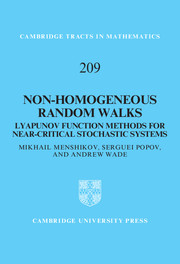5 - Heavy Tails
Published online by Cambridge University Press: 02 February 2017
Summary
Chapter Overview
So far, the processes that we have considered in this book have typically had increments whose first (and second) moments have been uniformly bounded. The focus of this chapter is on the case where first (or second) moments do not exist, i.e., the increments are heavy tailed. We consider Markov processes on R, and study questions of asymptotic behaviour, such as recurrence or transience.
This chapter deals with two different types of process. First, in Section 5.2, we study processes whose increments have, in some sense, heavier tails in one direction than the other.We investigate sufficient conditions for transience in the direction of the heavier tail, and quantify the transience by deriving results on the rate of escape and on moments of first passage and last exit times.
Second, in Section 5.3, we study processes whose increments are of two different types, depending on whether the current position is to the left or to the right of the origin. Such processes are known as oscillating random walks, and their study (via classical methods) goes back to Kemperman [157]. We consider a version of the model in which the increment distribution is signed, i.e., only jumps towards the origin are allowed. For these models, we study recurrence and transience.
In keeping with the theme of this book, the methods of this chapter are based on the semimartingale ideas of Chapter 2: for appropriate choices of Lyapunov function, we verify Foster–Lyapunov-style drift conditions. Verification of drift conditions usually entails some Taylor's formula expansions (as in Chapter 3) as well as some careful truncation ideas to deal with the heavy tails. The resulting proofs are relatively short, and based on some intuitively appealing ideas.
Directional Transience
Introduction
In this section we assume the following.
- Type
- Chapter
- Information
- Non-homogeneous Random WalksLyapunov Function Methods for Near-Critical Stochastic Systems, pp. 224 - 257Publisher: Cambridge University PressPrint publication year: 2016



